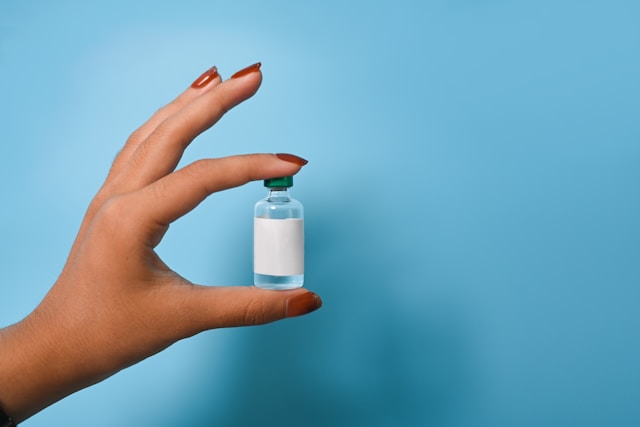This article is for informational purposes only and does not constitute medical advice. Always consult with a qualified healthcare provider before considering any peptide therapy.
Menopause triggers a cascade of hormonal changes that extend far beyond declining estrogen levels. The hypothalamic-pituitary-gonadal axis undergoes profound reorganization, disrupting neuropeptide systems that govern thermoregulation, bone metabolism, cognitive function, and immune homeostasis.
Peptide therapy for women offers targeted interventions that work with—not against—the body’s preserved feedback mechanisms, addressing vasomotor symptoms, bone health, metabolic shifts, and overall quality of life without relying solely on traditional hormone replacement.
Quick Takeaways
- Neurokinin-3 receptor antagonists reduce hot flash frequency by 60–70% within days by targeting kisspeptin/neurokinin B/dynorphin (KNDy) neurons in the hypothalamus
- Collagen peptides support bone density and skin elasticity through estrogen receptor β (ERβ) receptor signaling on fibroblasts
- Sermorelin stimulates natural growth hormone release to restore metabolism, bone strength, and cognitive clarity
- Combination approaches pairing peptides with micronutrient support produce better outcomes than single interventions
How Menopause Disrupts Neuropeptide Systems
The menopausal transition represents more than estrogen decline. Ovarian failure removes powerful negative feedback on the hypothalamus, triggering compensatory increases in follicle-stimulating hormone and luteinizing hormone.
The KNDy Neuron System
KNDy neurons, which coexpress kisspeptin, neurokinin B, and dynorphin, become hypertrophied after menopause. These neurons contain high concentrations of estrogen receptor-alpha, progesterone receptors, and androgen receptors.
When steroid signaling drops, gene expression shifts toward increased neurokinin B and kisspeptin (stimulatory peptides) and decreased dynorphin (inhibitory peptide). This imbalance drives (Gonadotropin releasing hormone) GnRH and (luteinizing hormone) LH hypersecretion while contributing to hot flashes through dysregulated thermoregulatory pathways.
Preserved Feedback Sensitivity
Studies using indirect pharmacological methods show that GnRH secretion increases in postmenopausal women compared to premenopausal controls. Importantly, estrogen’s ability to suppress GnRH and gonadotropin secretion remains largely intact even with advanced age, opening therapeutic opportunities to modulate these preserved pathways.
Third-Party Tested, 99% Purity
Order lab-verified peptides from our top recommended vendor.

Neurokinin-3 Receptor Antagonists for Vasomotor Symptoms
NK3 receptor antagonists represent the most clinically validated non-hormonal peptide approach for hot flashes and night sweats.
Fezolinetant: Clinical Evidence
A phase IIa proof-of-concept trial enrolled menopausal women aged 40–65 with moderate-to-severe vasomotor symptoms. Fezolinetant reduced hot flash frequency by 74–87% at week 12 compared to 55% with placebo. Benefits appeared within 24 hours of the first dose.
The SKYLIGHT 1 phase 3 trial evaluated 30 mg and 45 mg doses over 52 weeks. Fezolinetant 45 mg reduced hot flush frequency from 10.4 events per day to 4.1 events at week 12, a 61% reduction versus 35% with placebo. Severity improvements were sustained through one year and contributed to better sleep quality.
Mechanism of Action
NK3 antagonism blocks neurokinin B signaling in KNDy neurons within the infundibular hypothalamus, reducing inappropriate activation of thermoregulatory pathways that trigger cutaneous vasodilation. Secondary NK1 receptor desensitization further attenuates facial and neck blood vessel dilation.
Dual NK1/NK3 Antagonists
NT-814, which blocks both NK1 and NK3 receptors, demonstrated rapid efficacy at doses of 150 mg or higher. Participants experienced marked reductions in hot flashes and night sweats within the first week, with doses up to 300 mg well tolerated.
Collagen Peptides for Bone and Skin Health

Estrogen directly regulates collagen production through ERβ receptors on fibroblasts. When estrogen declines, collagen synthesis becomes compromised, accelerating skin aging and bone fragility.
Collagen and Estrogen Deficiency
Serum carboxyterminal propeptide of type I procollagen (PICP), a marker of collagen synthesis, increases by approximately 20% in postmenopausal women compared to premenopausal controls. This paradoxical increase reflects compensation for simultaneously elevated collagen degradation. Hormone replacement therapy reduces PICP to premenopausal levels within one year.
Clinical Benefits in Menopausal Women
A six-month trial evaluating calcium (1000 mg), vitamin D3 (400 IU), and collagen peptides (5 g) showed:
- 23% improvement in skin hydration
- 8.52% improvement in skin elasticity
- 12.23% elasticity increase with collagen alone
- Significant reductions in hair shedding across collagen groups
Animal models further show collagen hydrolysate attenuates weight gain and adipocyte enlargement in estrogen-deficient states, with effects comparable to estradiol. These anti-aging benefits extend beyond skin to support overall tissue health.
Genitourinary Applications
A pilot study combining vulvovaginal radiofrequency therapy with oral collagen peptides and ultra-low-molecular-weight hyaluronic acid produced superior improvements in symptoms, clinical signs, and vaginal pH versus radiofrequency alone.
Sermorelin for Growth Hormone Restoration
Sermorelin, a growth hormone-releasing hormone analog, stimulates endogenous pituitary growth hormone (GH) secretion rather than replacing the hormone exogenously.
Metabolic and Cognitive Benefits
Sermorelin’s 20-minute half-life prevents tachyphylaxis while preserving circadian hormone rhythms. Benefits include improved metabolism and energy, increased lean mass, enhanced glucose utilization, and improved cognitive clarity in perimenopausal and menopausal women.
Bone Density Support
Reduced GH levels correlate with lower bone mineral density and increased fracture risk. Restoring GH signaling through sermorelin improves bone density and complements exercise and vitamin D supplementation.
Interaction With Estrogen
Sermorelin does not alter estrogen levels directly and may be used alongside menopausal hormone therapy. Combined use has shown favorable effects on body composition, skin quality, and metabolic markers. For those interested in comparing different peptide approaches, sermorelin versus BPC-157 offers insights into distinct mechanisms.
Supporting Peptides for Comprehensive Care
Body Protection Compound-157 (BPC-157)
BPC-157 for women promotes angiogenesis and fibroblast activity via VEGFR2 and Akt-eNOS signaling, suppresses pro-inflammatory cytokines, and shifts macrophages toward regenerative phenotypes. Despite a short half-life, regenerative effects persist for weeks.
Thymosin Alpha-1
Thymosin alpha-1 enhances thymic output, supports T-cell maturation, reduces oxidative stress, and suppresses neuroinflammation, addressing immune and cognitive changes associated with menopause.
Comparison of Peptide Mechanisms
| Peptide | Primary Target | Onset | Main Benefits |
|---|---|---|---|
| Fezolinetant | NK3 receptors (KNDy neurons) | 1–3 days | Hot flash reduction, improved sleep |
| Collagen peptides | ERβ receptors (fibroblasts) | 4–12 weeks | Skin elasticity, bone markers, joint support |
| Sermorelin | Pituitary GHRH receptors | 2–4 weeks | Metabolism, bone density, cognition |
| BPC-157 | VEGFR2, Akt-eNOS pathways | 1–4 weeks | Tissue repair, inflammation control |
| Thymosin alpha-1 | T-cell differentiation | 4–8 weeks | Immune restoration |
Kisspeptin and Estrogen Modulation
Kisspeptin’s effects on LH secretion depend critically on adequate estradiol signaling. Studies show that estradiol replacement restores kisspeptin responsiveness, suggesting combination strategies may enhance therapeutic outcomes.
Gut Microbiota and the Estrobolome
Menopause alters gut microbiota composition, affecting estrogen metabolism, weight regulation, bone health, and cognition. Targeted probiotic and dietary strategies combined with peptide therapy may amplify results beyond either intervention alone.
Safety and Contraindications
- NK3 antagonists: Generally well tolerated; monitor liver function
- Collagen peptides: Excellent safety; avoid source allergens
- Sermorelin: Preserved feedback prevents overdose; contraindicated in active malignancy
- BPC-157 & Thymosin alpha-1: Limited long-term human data
Women with hormone-sensitive cancers should consult oncology specialists prior to peptide therapy.
Frequently Asked Questions
Can peptides replace hormone replacement therapy?
Peptides address specific mechanisms but do not fully replace systemic hormone support. Many women benefit from combination strategies.
How quickly do peptides work?
Onset ranges from days (NK3 antagonists) to weeks or months depending on the peptide and target tissue.
Can peptides be combined?
Yes. Complementary mechanisms often produce synergistic benefits under medical supervision.
References
- Modulation of body temperature and LH secretion by hypothalamic KNDy (kisspeptin, neurokinin B and dynorphin) neurons: a novel hypothesis on the mechanism of hot flushes. Front Neuroendocrinol. 2013;34(3):211-227. doi:10.1016/j.yfrne.2013.07.003. Available from: https://pmc.ncbi.nlm.nih.gov/articles/PMC3833827/
- Brief wake episodes modulate sleep-associated luteinizing hormone pulse frequency. Endocrinology. 2002;143(5):1737-1745. doi:10.1210/endo.143.5.8777. Available from: https://pubmed.ncbi.nlm.nih.gov/15671093/
- Estrogen negative feedback on gonadotropin secretion: evidence for a direct pituitary effect in women. J Clin Endocrinol Metab. 2000;85(5):1794-1800. doi:10.1210/jcem.85.5.6572. Available from: https://pubmed.ncbi.nlm.nih.gov/20133465/
- Neurokinin 3 receptor antagonism as a novel treatment for menopausal hot flushes: a phase 2, randomised, double-blind, placebo-controlled trial. Lancet. 2017;389(10081):1809-1820. doi:10.1016/S0140-6736(17)30823-1. Available from: https://www.thelancet.com/journals/lancet/article/PIIS0140-6736(17)30823-1/fulltext
- Fezolinetant for treatment of moderate-to-severe vasomotor symptoms associated with menopause (SKYLIGHT 1): a phase 3 randomised controlled study. Lancet. 2023;401(10382):1091-1102. doi:10.1016/S0140-6736(23)00085-5. Available from: https://pubmed.ncbi.nlm.nih.gov/36924778/
- The kisspeptin-GnRH pathway in human reproductive health and disease. Hum Reprod Update. 2014;20(4):485-500. doi:10.1093/humupd/dmu009. Available from: https://pubmed.ncbi.nlm.nih.gov/24615662/
- Elinzanetant for the treatment of vasomotor symptoms associated with menopause: a phase 3 randomized clinical trial. JAMA Intern Med. 2025;185(11):1319-1327. doi:10.1001/jamainternmed.2025.4421. Available from: https://pubmed.ncbi.nlm.nih.gov/40920404/
- A role for estrogen receptor-α and estrogen receptor-β in collagen biosynthesis in mouse skin. J Invest Dermatol. 2013;133(1):120-127. doi:10.1038/jid.2012.264. Available from: https://pubmed.ncbi.nlm.nih.gov/22895361/
- Calcium and Vitamin D Supplementation with and Without Collagen on Bone Density and Skin Elasticity in Menopausal Women—A Randomized Controlled Study. Clin Pract. 2025;15(9):168. doi:10.3390/clinpract15090168. Available from: https://pmc.ncbi.nlm.nih.gov/articles/PMC12468524/
- Continuous Kisspeptin Administration in Postmenopausal Women: Impact of Estradiol on Luteinizing Hormone Secretion. The Journal of Clinical Endocrinology & Metabolism, Volume 102, Issue 6, June 2017. Available from: https://academic.oup.com/jcem/article/102/6/2091/3075152
- Therapeutic potential of pro-angiogenic BPC157 is associated with VEGFR2 activation and up-regulation. J Mol Med (Berl). 2017;95(3):323-333. doi:10.1007/s00109-016-1488-y. Available from: https://pubmed.ncbi.nlm.nih.gov/27847966/
- Regeneration or Risk? A Narrative Review of BPC-157 for Musculoskeletal Healing. Curr Rev Musculoskelet Med. 2025;18(12):611-619. doi:10.1007/s12178-025-09990-7. Available from: https://pmc.ncbi.nlm.nih.gov/articles/PMC12446177/
- Aging and Thymosin Alpha-1. Int J Mol Sci. 2025;26(23):11470. doi:10.3390/ijms262311470. Available from: https://pmc.ncbi.nlm.nih.gov/articles/PMC12692621/
- Menopause Is Associated with an Altered Gut Microbiome and Estrobolome, with Implications for Adverse Cardiometabolic Risk in the Hispanic Community Health Study/Study of Latinos. mSystems. 2022;7(3):e00273-22. doi:10.1128/msystems.00273-22. Available from: https://pmc.ncbi.nlm.nih.gov/articles/PMC9239235/
- Gut microbial beta-glucuronidase: a vital regulator in female reproductive health and disease. Gut Microbes. 2023;15(2):2236749. doi:10.1080/19490976.2023.2236749. Available from: https://www.tandfonline.com/doi/full/10.1080/19490976.2023.2236749
